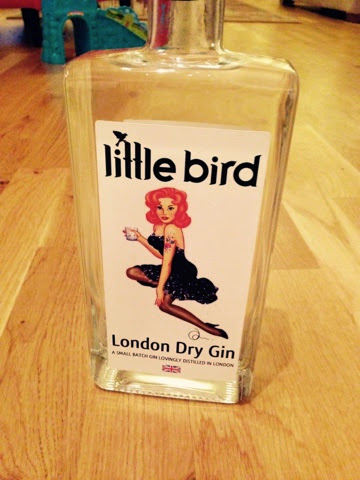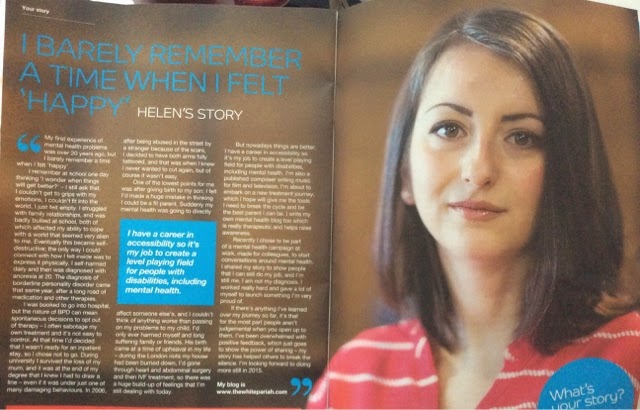Merry 'Stigmas'
Today dear readers, let me lead you gently but firmly back to our old familiar favourite, stigma. Let's explore the phenomenon of stigma disguised as acceptance. A particularly slippery fish, this one. Alright, alright yes - it's Christmas. Not exactly a time to be ruminating on our various daily bugbears, right? Categorically and emphatically, NO. I laugh in the face of Chris and his mate T'mas. Coming round here every year, bringing Pound Shop glitter trodden into the carpet and Iceland 'canapes'. I'm sneering as I write this obviously. I'll tell you more about my issues with this particular festival another time, as I imagine if you're actually reading this on Christmas eve you probably feel similarly. NOw back to the point (I'm sure there was one somewhere).
Picture, if you will, a feature in a mostly decent and for the most part objective newspaper. Inset, is a photograph of a middle-aged woman gazing knowingly half into the lens of the camera, against a backdrop of art and bookshelves stuffed full of respectable looking texts. She appears aloof, and slightly troubled. The headline reads:
"Academic, historian and feminist. She is also a former psychiatric patient."
She's obviously very well educated, intelligent and well-respected, but - ooh... hmm - bit of a 'blip' in the past should we say?
Another newspaper, this time one with a little less in the way of, shall we say, 'factual analysis' for the discerning reader. A picture of a leather-faced sexagenarian smiling wryly from a comfortable armchair, surrounded by expensive looking nik naks; his wife tenderly cradling his hand as she attempts to force her surgically paralysed lips into a smile. Another headline:
"Successful property magnate, politician and father. He is also a former convict."
Well this guy's certainly successful considering he had a bad start - look how well he's done for himself after being in prison! Impressive. Just goes to show how people come good in the end.
Now you may point out, perfectly understandably, that there's a certain gender dynamic at work here. Men are often lauded for succeeding despite wrongdoings, but women are charity cases. Women can't succeed alone. Deeper still into our social psyche - and we find that in contrast to someone with a criminal past, a person with a stint in a mental hospital under their belt comes off worst. The messages are subtle - subliminal even. Pick a card, any card... as long as it's not the one with a woman with any sort of mental illness.
Now imagine that mental illness was thought of in the same way as physical illness. If that were true, this headline could have ended with: "She also once saw her GP about a wart on her toe". Ridiculous, quite obviously. Lately we've heard disability and mental health mentioned more than usual by the powers that be; more beds, parity, targets, blaaaah blaaaah. But the reality is that the government are just ticking off the list - they do it because it makes them look good, and it saves money. I hope most of you will know this anyway, but these are of course the wrong reasons.
I have a cardiac arrhythmia for which I see a consultant every 6 months. It's a benign condition that causes very little discomfort day to day. In stark contrast, I only see a doctor for my mental health when I beg, and by begging I actually mean daily calls to either my GP or my private medical insurers and a bloody-mindedness that leaves me utterly exhausted. I have a 20+ year history of mental illness, but I've only managed to see 3 psychiatrists in that time and I only got the correct diagnosis this year (or did I?).
After I gave birth I had very severe post-natal depression, only I didn't tell anyone because I was afraid my child would be taken from me. You only need to have been in the UK five minutes to have seen the horrific story of a mother with schizophrenia who took drastic action in fear that her newborn would be taken from her; tragically they both lost their lives. I felt so deeply sad that this had happened when I know she could've lived with the right treatment at the right time. Mental illness kills, and contrary to popular belief, it kills in exactly the same way as cancer does. Suicide is not a choice. It's an outcome - an outcome resulting from a terminal illness. Sometimes the treatment is too late, sometimes it doesn't work, there is NO DIFFERENCE between this, and a physical illness.
I find it particularly surprising that this disparity exists, given the cost of untreated mental illness. A government, a society and a system that so vehemently pursues capital should be falling over themselves to avoid footing the bill for the sort of complex treatment required when Jonny Commoner's been left to his own devices for too long.
Around 2% of the population have my diagnosis - borderline personality disorder - and 10% of these people complete suicide. That's a scary statistic. I'm one of the lucky ones, so far. As such, I try to recognise the things about me that I wouldn't have if it wasn't for my illness. I have no idea how I ended up where I am, with a job I love, a new family and the wherewithal to understand myself and recognise that things are going wrong in time to avoid disaster. I tick every box of the DSMV, which gives a combination of 256 presentations (read the last linked article from my Facebook page at facebook.com/whitepariah). Anger is the only thing I know I'm feeling when it happens. It happened just today - some cretinous twat upon rounding a corner at the same time as a postman was coming round said corner from the opposite direction gave the poor guy a mouthful of abuse. My body was telling me to say something, punch him in the face, bring justice to an unfair situation. I don't know why I didn't do anything, but it was exactly the sort of situation that in the past would've got me into danger.
Stigma has become so ingrained in us that it can sneak in unnoticed. I do it myself - I use the word 'mental' interchangeably with 'crazy' and both to mean something is not right, annoying, unstable. I, like most others, give myself the excuse of being able to reference a label because I'm affected by it.
There's talk of changing the name of BPD to 'complex trauma', or 'emotional regulation disorder'. I prefer the former. When a psychiatrist tells you you're hitting the top end of the severity chart, it becomes even more baffling to think that one might have so much insight, yet still be unable to overcome the dialectical tension. That I'm so willing to talk honestly about my faulty mind bears testament to my level of understanding (oh, and my narcissism of course). People don't trust the label, and neither do I.
"Can you imagine if mental health was still a taboo?! I mean... just... wow."
"Hmmm? Oh, like back in 2014 when people still thought the mind was simultaneously the most beautiful, important thing, and yet still something not worth bothering to look after?"
"Yeah. Yep. That was mental."


Comments
Regards
Paul Smith